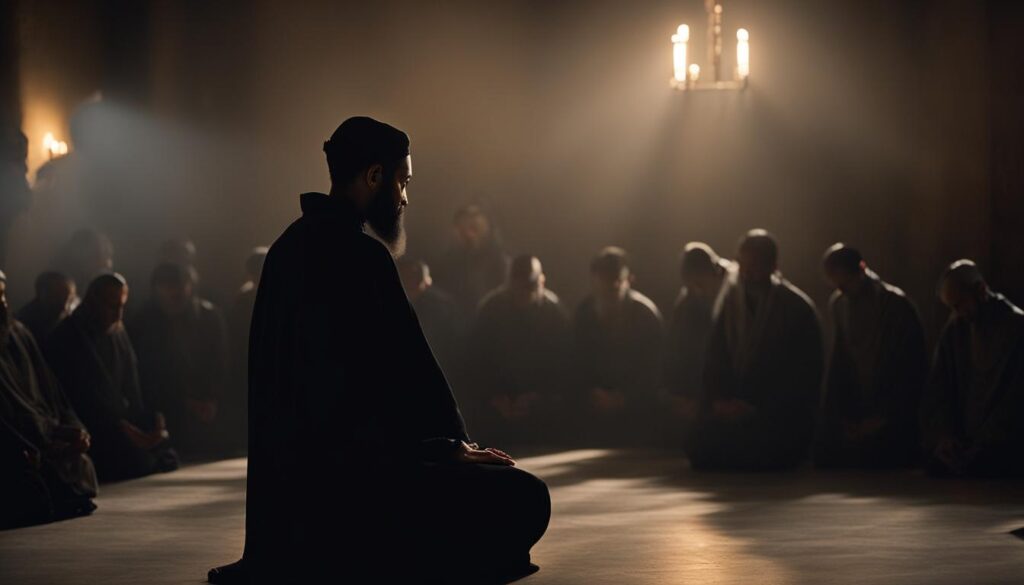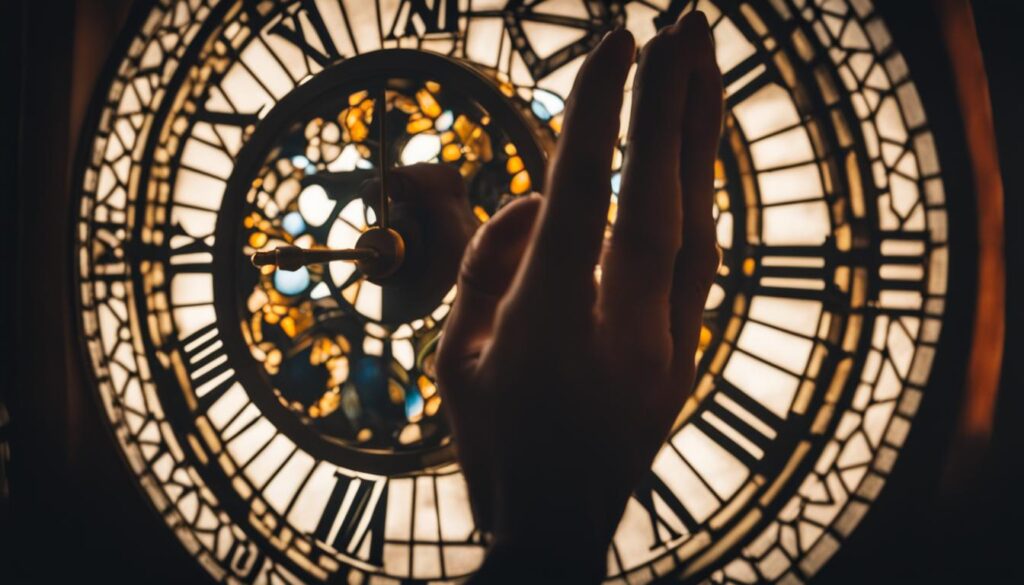The Witr prayer is a compulsory prayer in Islam. It is three rak’at with one tasleemah (saying of salaam) and a qunoot (supplication) after the recitation. There are different opinions on whether it is sunnah, fard, or waajib, with the last saying of al-Imam Abi Hanifah being that it is waajib. In every rak’ah, one should recite the Faatihah and another surah. The prayer is similar to Maghrib prayer with the additional recitation of the surah and qunoot in the third rak’ah.
Key Takeaways:
- The Witr prayer is a compulsory prayer in Islam, consisting of three rak’at.
- Recitation of the Faatihah and another surah is required in each rak’ah.
- The qunoot, a supplication, is recited after the recitation.
- The Witr prayer is similar to Maghrib prayer with additional elements.
- Different opinions exist regarding the status of the Witr prayer.
The Timing of the Witr Prayer
The Witr prayer, a compulsory prayer in Islam, should be performed after salatul ‘isha (the night prayer) and before salatul fajr (the dawn prayer). The exact timing of the Witr prayer can vary, but there are some recommendations to consider. If you think you may not wake up for the Witr prayer in the latter portion of the night, it is advised to pray it early. On the other hand, if you believe you will wake up for the Witr prayer, it is preferred to delay it until the latter portion of the night.
While there is flexibility in the timing of the Witr prayer, it is important to note that it is recommended to pray it individually. Praying the Witr prayer in congregation is mainly recommended during the month of Ramadan. Outside of Ramadan, it is generally advised to pray Witr individually. This prayer is a personal act of worship and offers an opportunity to connect with Allah and seek His guidance and forgiveness.
Here is a table summarizing the recommended timing of the Witr prayer:
| Timing Recommendation |
|---|
| Early Witr |
| Pray Witr early if you think you may not wake up for it in the latter portion of the night. |
| Latter Witr |
| If you believe you will wake up for the Witr prayer, it is preferred to delay it until the latter portion of the night. |
By adhering to the recommended timing of the Witr prayer, Muslims can ensure they fulfill this important obligation and maintain a strong connection with Allah throughout the night.
Number of Rak’at in the Witr Prayer
The Witr prayer is a unique prayer in Islam, known for its flexibility in the number of rak’at (units) that can be performed. There are different opinions among scholars regarding the recommended number of rak’at in the Witr prayer. Some sources suggest performing two rak’at followed by one rak’ah, with a tashahud and taslim. Others advise praying all the rak’at continuously, with two tashahuds and one taslim. It is also permissible to pray a different number of rak’at without making any tashahud, except in the one before the last rak’ah.
The Prophet Muhammad’s practice varied, with narrations mentioning him praying Witr with five, seven, nine, or even one rak’ah. This flexibility allows individuals to choose the number of rak’at that best suits their personal preference and capacity for worship. The essence of the Witr prayer lies in its completion, regardless of the specific number of rak’at performed.
Table
| Number of Rak’at | Tashahud | Taslim |
|---|---|---|
| 2 rak’at followed by 1 rak’ah | Yes | Yes |
| All rak’at continuously | Yes | Yes |
| Varies | No tashahud, except before the last rak’ah | No |
By offering the Witr prayer with sincerity and devotion, Muslims can seek closeness to Allah and benefit from the spiritual rewards associated with this special act of worship.

Recitation and Qunoot in the Witr Prayer
In each rak’ah of the witr prayer, one should recite the Faatihah and another surah. The recitation should be done in a calm and melodious manner, reflecting the deep connection with Allah. It is a time to immerse oneself in the beauty of the Quran and seek Allah’s blessings.
The qunoot, or supplication, is an integral part of the witr prayer. It is a moment to humbly beseech Allah for His help, guidance, and forgiveness. The specific words of the qunoot can vary, but it typically begins with “Oh Allah! We beseech Your help…” This powerful supplication allows the worshipper to pour out their heart and connect with Allah on a profound level.
Oh Allah! We beseech Your help and seek Your forgiveness. We believe in You, put our trust in You, and turn to You in repentance. We seek refuge in You from the evil within ourselves and the consequences of our actions. Grant us guidance, mercy, and paradise. Forgive us, have mercy upon us, and protect us from the punishment of the grave and the Hellfire. Oh Allah! Grant us success in this life and the hereafter. Ameen.
The Timing and Recitation of Qunoot
The timing and recitation of qunoot in the witr prayer can vary according to different opinions and schools of thought. Some scholars suggest reciting the qunoot throughout the year before going into the rukuu’, while others believe it should only be done during the last half of the month of Ramadan. There is also a view that qunoot should only be recited in the witr prayer and Fajr prayer.
Regarding the recitation of qunoot by the followers, there are differing opinions. Some scholars recommend reciting the qunoot along with the imam, while others advise remaining silent during the imam’s recitation. It is important for individuals to follow the guidance of their local scholars and adhere to the practices of their respective communities.

Overall, the recitation and qunoot in the witr prayer provide a unique opportunity for Muslims to connect with Allah and seek His blessings and forgiveness. Through the beautiful recitation of the Quran and heartfelt supplication, individuals can deepen their spiritual connection and find solace in their relationship with Allah.
Different Ways to Perform Witr: Exploring the Variations in Witr Prayers
The witr prayer, a significant act of worship in Islam, allows for various ways of performance. The Prophet Muhammad’s teachings indicate flexibility in the number of rak’at and the order in which they are prayed, providing Muslims with options to adapt the witr prayer to their individual circumstances and preferences.
One approach to performing the witr prayer is to combine two rak’at followed by one rak’ah with a tashahud and taslim. This method aligns with the opinion of some scholars and offers a structured sequence for the prayer.
Another variation involves praying all the rak’at with two tashahuds and one taslim, which provides a more continuous flow of worship without breaks for additional tashahud prayers.
“The Prophet Muhammad would pray witr with different variations, combining the rak’at in various ways, attesting to the flexibility and adaptability of the witr prayer.”
Additionally, the Prophet Muhammad is reported to have prayed witr with different numbers of rak’at, ranging from three to thirteen. This demonstrates that Muslims have the freedom to choose the number of rak’at that suits them best, provided they adhere to the minimum requirement of three rak’at for the witr prayer.
| Number of Rak’at | Method |
|---|---|
| 3 | Praying three rak’at continuously, without any additional tashahud prayers. |
| 5 | Praying three rak’at, followed by two additional rak’at without tashahud prayers. |
| 7 | Praying three rak’at, followed by four additional rak’at without tashahud prayers. |
| 9 | Praying three rak’at, followed by six additional rak’at without tashahud prayers. |
| 11 | Praying three rak’at, followed by eight additional rak’at without tashahud prayers. |
| 13 | Praying three rak’at, followed by ten additional rak’at without tashahud prayers. |
By embracing the variations in the witr prayer, Muslims can personalize their worship experience while upholding the essential elements of this spiritual act. The ability to adapt the witr prayer to individual preferences ensures that it remains a meaningful practice that strengthens the connection between Muslims and Allah.

Timing of Qunoot in Witr Prayer
The timing of qunoot in the witr prayer can vary depending on different interpretations and practices. Some sources suggest reciting the qunoot before going into rukuu’, while others recommend reciting it after the rukuu’ in the third rak’ah of the witr prayer. The choice of timing can be influenced by personal preference, cultural traditions, or following a particular school of thought.
In some communities, the qunoot is recited before going into rukuu’ in order to seek Allah’s guidance, mercy, and protection before bowing down in prayer. This allows for a moment of reflection and supplication, emphasizing the importance of seeking spiritual strength and guidance during the prayer.
On the other hand, there are those who recite the qunoot after the rukuu’ in the third rak’ah of the witr prayer. This practice is based on the belief that the qunoot should be recited after seeking refuge in Allah and humbling oneself in the rukuu’. By reciting the qunoot after the rukuu’, it is seen as a continuation of the prayer and a way to seek further closeness to Allah.
Regarding the recitation of qunoot in congregation, there are differing opinions. Some scholars believe that the followers should recite the qunoot along with the imam, while others suggest remaining silent during the qunoot. This variance in practice can depend on the local customs, cultural norms, or the teachings of specific religious scholars.

Table: Different Perspectives on the Timing of Qunoot in Witr Prayer
| Timing | Explanation |
|---|---|
| Before Rukuu’ | Reciting qunoot before going into rukuu’ to seek Allah’s guidance and protection. |
| After Rukuu’ | Reciting qunoot after the rukuu’ in the third rak’ah as a continuation of the prayer. |
While there are variations in the timing and recitation of qunoot, it remains an important aspect of the witr prayer. Whether recited before or after the rukuu’, the qunoot serves as a moment of supplication, seeking Allah’s guidance, mercy, and protection during this special prayer.
The Spiritual Significance of the Witr Prayer
The Witr prayer holds a special place in the hearts of Muslims due to its spiritual significance. It is not only a means of fulfilling a religious obligation but also an opportunity to seek closeness to Allah and nourish the soul with His remembrance. This powerful act of worship carries multiple benefits and rewards for those who perform it with sincerity and devotion.
One of the most profound aspects of the Witr prayer is that it allows Muslims to ask for Allah’s guidance, forgiveness, and protection. Through this prayer, believers can humble themselves before their Lord, acknowledging their dependence on Him and seeking His mercy. It is a moment to pour out one’s heart in supplication, seeking solace and support from the Creator.
The importance of the Witr prayer is reflected in the words of the Prophet Muhammad, who said, “Allah is One and He loves the witr.” This statement emphasizes the significance and value that Allah places on this particular prayer. By regularly performing the Witr prayer, Muslims can deepen their connection with Allah, strengthen their faith, and experience the spiritual benefits that come with this act of worship.
Table: Benefits of the Witr Prayer
| Benefit | Description |
|---|---|
| Seeking Forgiveness | The Witr prayer provides an opportunity to seek forgiveness for sins and seek Allah’s mercy. |
| Strengthening Connection with Allah | Regularly performing the Witr prayer helps Muslims develop a stronger bond with Allah and deepen their spiritual connection. |
| Protection from Evil | By seeking Allah’s protection in the Witr prayer, believers can guard themselves against the influence of negative forces. |
| Increased Spirituality | The Witr prayer serves as a means to elevate one’s spirituality and draw closer to Allah. |
| Gratitude and Humility | The Witr prayer provides an opportunity to express gratitude to Allah and demonstrate humility before Him. |
Praying the Witr prayer, with its profound spiritual significance and numerous benefits, is a way for believers to enrich their relationship with Allah and nurture their souls. By embracing this act of devotion, Muslims can experience the transformative power of connecting with the Divine and find solace, guidance, and blessings in their lives.
Praying Witr in Congregation
While it is recommended to pray the witr prayer individually, it is also permissible to pray it in congregation. However, it is important to note that praying the witr prayer in congregation is mainly recommended during the month of Ramadan. Outside of Ramadan, it is generally advised to pray witr individually. Praying the witr prayer in congregation during Ramadan is seen as a communal act of worship that strengthens the bond among Muslims and adds to the spiritual atmosphere of the month.
Praying witr in congregation during Ramadan offers a unique opportunity for Muslims to come together as a community and create a sense of unity. It is a powerful way to strengthen the bonds of brotherhood and sisterhood in Islam. By standing shoulder to shoulder in prayer, Muslims can experience a deep sense of connection and solidarity with their fellow worshippers.
Additionally, praying witr in congregation during Ramadan can enhance the spiritual atmosphere of the month. The collective recitation of the Quran and the supplications made during the qunoot create a powerful and uplifting environment. It is a time when Muslims can collectively seek forgiveness, guidance, and blessings from Allah. The sense of unity and devotion that comes from praying witr in congregation during Ramadan can greatly enrich the spiritual experience of fasting and worship during this blessed month.
The Importance of Praying Witr in Congregation during Ramadan
Praying witr in congregation during Ramadan holds special significance in Islam. The Prophet Muhammad encouraged Muslims to perform the witr prayer in congregation, particularly during this blessed month. It was reported that he himself would lead the congregation in the witr prayer during Ramadan, setting an example for his followers. By following the Prophet’s example, Muslims can benefit from the blessings and rewards associated with praying witr in congregation.
Prophet’s Example in Performing Witr Prayer
The Prophet Muhammad, peace be upon him, serves as a perfect example for Muslims in performing the witr prayer. He demonstrated various ways of incorporating this vital prayer into his night routine, highlighting its significance in connecting with Allah and seeking His blessings. The Prophet would often pray witr at different times throughout the night, showcasing his devotion and commitment to spiritual practices.
In addition to offering the witr prayer, the Prophet Muhammad would recite the Quran, make supplications, and engage in worship during his night prayer. This comprehensive approach emphasized the importance of dedicating time and attention to seeking Allah’s guidance and forgiveness. The Prophet’s night prayer exemplified the concept of sincerity and devotion in establishing a strong relationship with the Creator.
The Prophet Muhammad’s night prayer, which included the witr prayer, holds valuable lessons for Muslims today. It teaches us to prioritize our spiritual connection with Allah, even in the midst of our daily responsibilities. By following the Prophet’s example in performing the witr prayer and engaging in worship during the night, Muslims can strengthen their faith, find solace, and experience the blessings and rewards associated with sincere devotion.
| Key Points | Prophet’s Way of Praying Witr |
|---|---|
| 1 | The Prophet Muhammad prayed witr at different times throughout the night, showcasing the flexibility of this prayer. |
| 2 | The Prophet engaged in recitation of the Quran, supplication, and worship during his night prayer, emphasizing the comprehensive nature of his devotion. |
| 3 | Following the Prophet’s example in offering the witr prayer and dedicating time to worship allows Muslims to deepen their connection with Allah and seek His blessings. |
Importance of Witr Prayer Before Fajr
The Witr prayer holds immense significance in Islam, and offering it before Fajr is highly recommended. As the Prophet Muhammad advised, making the Witr prayer the last prayer of the night is a testament to its importance in our worship. By dedicating this special time before the break of dawn to perform the Witr prayer, we conclude our night with a final act of devotion and closeness to Allah.
Praying the Witr prayer before Fajr allows us to seek forgiveness, guidance, and protection from Allah as we start a new day. It sets the tone for our spiritual journey ahead and reminds us of the constant need to turn to our Creator for support and strength. By offering the Witr prayer in the early hours of the morning, we demonstrate our dedication and sincerity in seeking Allah’s pleasure.
Moreover, praying the Witr prayer before Fajr helps us develop discipline and consistency in our worship. It serves as a reminder of the importance of prioritizing our spiritual well-being and making time for acts of worship that bring us closer to Allah. By establishing the habit of performing the Witr prayer before Fajr, we reinforce the values of commitment and devotion in our daily lives.
In conclusion, offering the Witr prayer before Fajr is a practice that reflects the profound significance of this prayer in Islam. It allows us to conclude our night with a final act of worship, seek Allah’s blessings for the day ahead, and strengthen our connection with our Creator. By making the Witr prayer a regular part of our routine, we embrace the spiritual benefits it offers and cultivate a deeper sense of spirituality in our lives.
FAQ
What is the Witr prayer in Islam?
The Witr prayer is a compulsory prayer in Islam consisting of three rak’at, with one tasleemah and a qunoot supplication after the recitation.
Is the Witr prayer sunnah, fard, or waajib?
There are different opinions, with some scholars considering it sunnah, fard, or waajib. According to al-Imam Abi Hanifah, it is considered waajib.
When should the Witr prayer be performed?
The Witr prayer should be performed after salatul ‘isha and before salatul fajr. The exact timing can vary, but it is recommended to pray it early or delay it based on one’s waking up for later portions of the night.
How many rak’at are there in the Witr prayer?
The number of rak’at in the Witr prayer can vary. Some sources mention performing it as two rak’at followed by one, while others suggest praying all the rak’at with two tashahuds and one taslim. It is also permissible to pray a number of rak’at without making any tashahud, except in the one before the last rak’ah.
What should be recited during the Witr prayer?
In each rak’ah of the Witr prayer, one should recite the Faatihah and another surah. During the qunoot, a specific supplication is made, starting with “Oh Allah! We beseech Your help…”.
Are there variations in the way the Witr prayer is performed?
Yes, the Prophet Muhammad prayed Witr with different variations, ranging from three to thirteen rak’at. He would combine the rak’at in different ways, including praying two rak’at followed by two and so on. His actions demonstrate flexibility in the way the Witr prayer can be performed.
How does the timing of qunoot in the Witr prayer vary?
There are different opinions on the timing of qunoot in the Witr prayer. Some sources say it should be recited before bowing, while others mention it should be after the rukuu’. Additionally, there are different views on whether the followers should recite qunoot along with the imam or not.
What is the spiritual significance of the Witr prayer in Islam?
The Witr prayer holds special spiritual significance as a way to seek closeness to Allah, ask for His guidance, forgiveness, and protection. The Prophet Muhammad emphasized its importance by saying, “Allah is One and He loves the Witr.”
Can the Witr prayer be performed in congregation?
While it is recommended to pray the Witr prayer individually, it is permissible to pray it in congregation during Ramadan. Outside of Ramadan, it is generally advised to pray Witr individually.
How did the Prophet Muhammad perform the Witr prayer?
The Prophet Muhammad set an example by praying Witr at different times throughout the night. He would recite the Quran, make supplications, and engage in worship during the night prayer.
Why is it important to perform the Witr prayer before Fajr?
The Prophet Muhammad advised Muslims to make Witr prayer their last prayer at night, highlighting the importance of dedicating time before Fajr for this prayer.








